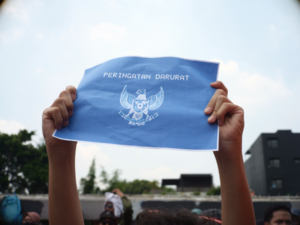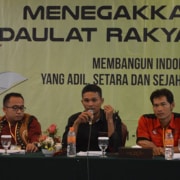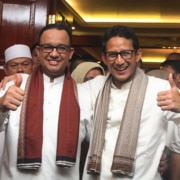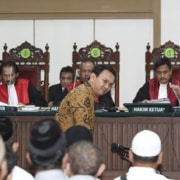
Photo by Project M/Adrian Mulya
The large-scale rally by Indonesia’s pro-democracy activists to prevent the passing of a piece of legislation aimed at stifling electoral competition and cementing President Joko “Jokowi” Widodo’s political dynasty is proof that grassroots forces are alive and well.
Their movement, however, remains prone to being co-opted by oligarchic elites. It is sporadic, reactionary and fragmented. It is also devoid of a grand strategy that could bring about a meaningful structural change. It is high time for the progressives — led by student groups, labor unions and NGO activists — to establish a political vehicle and directly engage in politics. They must stop serving as cannon fodder for recurrent intra-oligarchic conflicts.
A glimmer of hope
Indonesians are largely described as casual democrats. They believe in democracy, according to one study, but they are also permissive about authoritarianism.
That said, the nation’s civil society forces have repeatedly demonstrated that — in spite of their structural limitations — they are still capable of mobilising and taking to the streets to right the wrongs of the elite.
This does not always work, but when it does, it offers a spark of hope that there is a group of people who care enough to put their safety on the line to defend hard-won freedoms.
In 2019 and 2020, pro-democracy activists lost to the oligarchy despite having triggered the largest grassroots mobilisation since Reformasi. The ReformasiDikorupsi (ReformCorrupted) movement was a response to the oligarchic consolidation that took place after Jokowi’s re-election, marked by his reconciliation with his former election rival, Prabowo Subianto.
Despite crowds in the streets across Indonesia, dominant oligarchic alliance at the time — consisting heads of political parties controlling more than 70 percent of seats at the House of Representatives (DPR) and powerful coal mining oligarchs — was solid enough to pass laws to weaken the Corruption Eradication Commission (KPK), reinstate illiberal provisions in the new Criminal Code (KUHP), and enact the Omnibus Law on Jobs Creation, dubbed by critics the “Oligarchy Code”.
The latest mobilisation, which began with a meme of a blue screen showing the text “Peringatan Darurat” (emergency warning), was less massive than the previous protests. It was triggered primarily by the DPR’s plan to pass into law a revision of the 2017 Regional Elections law that would bar the Indonesian Democratic Party of Struggle (PDI-P) from contesting the Jakarta gubernatorial election, perhaps nominating Anies Baswedan, a political enemy of Jokowi. It would also allow Jokowi’s 29-year-old son, Kaesang Pangarep, to contest the election in Central Java, winning a stronghold for the President’s nascent political dynasty.
The bill, if passed into law, would overrule recent Constitutional Court rulings that reduce the 20 percent legislative threshold to nominate a regional head candidate, and set the age limit for gubernatorial candidates at 30 years. In a clear challenge to the court’s rulings, the lawmakers want to threshold at 20 percent (which would block PDI-P) and set the new age limit at 25 years old (which would legitimate Kaesang’s candidacy).
The Darurat Demokrasi protests turned ugly, saw gates to the DPR compound torn down, and led to the arrests of dozens of student protestors, but they worked: lawmakers could not form quorum and decided to at least postpone the passage of the law. It remains to be seen if this marks the end of the contentious revisions the DPR and Jokowi want, but it is nonetheless a very significant achievement.
Now the big question is: is this the final goal of the pro-democracy movement? If not, then what is?
The perils of co-option
The fundamental problem of Indonesia’s student-led movement is that it never transforms into a political party movement that could help them fight for their progressive causes in the legislature or government. It is stuck in a post-cold war hangover by portraying itself as a moral, rather than political, movement that must be insulated from short-term “elite interests”. The irony is that this strategy only makes the movement even more vulnerable to elite co-option.
It is critical to point out that intra-elite conflicts usually serve as the backdrops to mass mobilisations by the progressive forces in Indonesia. In the late 1990s, for example, the oligarchic faction opposed to president Soeharto supported the Reformasi movement to dissolve the New Order as an authoritarian regime.
In 2019 and 2020, the oligarchic faction led by President Susilo Bambang Yudhoyono and Jusuf Kalla stood behind the ReformasiDikorupsi movement to subvert the dominant elite faction led by President Jokowi.
In the last few days, PDI-P elites have been amplifying the progressive agenda of criticising Jokowi’s autocratic tendencies, seeking to frame itself as the party of the people not the party of the oligarchs (even though it was at heart of Jokowi’s ruling coalition until the last elections)
It is clear that the public outrage over elite shenanigans is genuine and that many of those taking part in the protests are driven by genuine hopes for a more democratic Indonesia. That said, it is also seems to be the case that the PDI-P or the elite figures behind former presidential candidate Anies Baswedan — such as Jusuf Kalla — are capitalising on the current political crisis. This is evidenced by the fact that the social media influencers now encouraging and praising the student movements are the same people who were paid by Jokowi allies, including the PDI-P, to demonize the student and labor activists protesting against the KPK revision and job creation law in 2019 and 2020.
The problem is that student protests tend to be sporadic and short-lived. More often than not, the elite are the ones sustaining pressure on the government, for their own benefit. The absence of a political contract between the progressive forces and the oligarchic-controlled parties allows the latter to pursue their own agendas once they have exploited mass movements to win power.
The Darurat Demokrasi protestors may have helped the PDI-P contest the Jakarta election, but who will guarantee that party will not use its new power to make political bargains with Prabowo to oust Jokowi, reaffirming the hegemony of the oligarchy?
A movement party
The latest mass rallies are testament to Indonesians’ commitment to democracy, regardless of what the political surveys say. They are also momentum for progressive Indonesians to come up with a new plan to advance their visions of a more democratic and just Indonesia.
The rise of the Move Forward Party in Thailand shows that social movements can transform into political parties. It would not be easy for Indonesian progressives to follow the footsteps of their fellows in the neighboring country but it is not impossible. They have collective demands existing parties can exploit but not meet, collective anger they can manipulate but not appease.
Only by creating a mass-based movement that could work within formal political avenues – mainly the legislature – can Indonesian progressives escape the vicious cycle of sporadically fighting elite battles only to return to square one after winning short-lived small victories.










